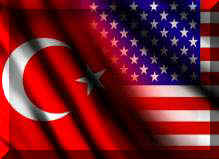By MEHMET ÖĞÜTÇÜ, Hurriyet Daily News
Who could have predicted a decade ago the current state of affairs between Ankara and Washington?
The Turkey-U.S. standoff looks more like a flashpoint between enemies than a difference of views between friends. Turkey is angry that Fethullah Gülen, a U.S.-resident cleric believed to be behind last year’s coup attempt, has not been extradited. It also objects to the U.S.’s choice of allies in the Syrian civil war. The U.S. is arming Kurdish fighters there who have uncontested ties to the violent outlawed Kurdistan Workers’ Party (PKK) in Turkey.
And those grievances have sharpened against the backdrop of a rapidly changing Middle East, with U.S. power apparently in retreat, driving Turkey to search for new friends, from Russia and Iran to China.
It’s hardly surprising that the effect of this deterioration is strong anti-American sentiment in Turkey. According to the Pew Research Center, only 13 percent of Turks have a positive perception of American ideals, and 72 percent of Turks feel threatened by American power and influence.
Even the Turkish military, the staunchest pillar of the bilateral alliance during the Cold War era, has become a fervent bastion of anti-American sentiment. And the U.S. Ambassador John Bass was about to be declared persona non grata a few days before his departure for his new post in Kabul. Washington has now fewer friends in Ankara than any time in history.
The souring in bilateral relations is not helped by an absence of strategic focus and common interests.Turkey is no longer viewed as the model democracy and reliable foreign policy partner the U.S. seeks in the Muslim world. But America’s reluctance to accept Turkey’s legitimate concerns in Syria, and U.S. equivocation during the failed coup attempt, have left Turkish officials nervous of Washington’s true intentions.
Although trade and investment levels are far beyond the ambitious goals set two decades ago, the two countries’ charismatic and strong-willed leaders have not yet been able to forge a pragmatic framework to put the relationship back on track. A credible Turkish voice is missing in the corridors of power in Washington.
There is an acute need to appreciate the value each party assigns to the relationship, and to move beyond a transactional approach toward a reset of the strategic partnership that has often worked well in the past. If not, things will surely go from bad to worse.
Ankara feels isolated by the West, snubbed by the U.S. and the European Union. Turkey has lost interest in joining the EU amid endless indecision and delay in Brussels. Those who argue that the country should look to Eurasia, not across the Atlantic, are increasingly prominent in Ankara’s considerations. President Recep Tayyip Erdoğan has expressed interest in joining the Shanghai Cooperation Organization, a bloc pioneered by China and Russia.
Both countries must recognize that in a new era of a “game-changing” global power shift, their roles and relationships to each other have changed dramatically. Washington should get used to dealing with a more assertive partner, and focus on what unites both nations rather than expecting as in the past a blind loyalty to its global aspirations and goals.
Any reset should focus not only on what Washington wants immediately from Turkey in Syria, Iraq, Russia and China but must plant the seeds of a broader and genuine partnership from which both nations can benefit. If U.S. President Donald Trump and Erdoğan can look beyond their personality clashes to see their common long-term interests, they will exert a positive influence on a troubled region and the wider world.
Erdoğan’s reputation in the U.S. Congress and American media is in tatters, and he needs to make strenuous efforts to reverse this in order to find receptive ears. The U.S.’s reputation in Turkey is also seriously damaged. If they want to maintain and advance the common interests agenda, Turkey and the U.S. must focus without further delay on pragmatic steps – stronger security, trade, investment, energy and technology ties that can help repair their frayed alliance and build confidence. Both countries also need to accept each other’s legitimate global interests and priorities in a rapidly changing world, rather than dictating their wills.
A revitalized relationship built on common interests, respect, understanding and steady achievement could have transformative effects. Otherwise, we are destined for a further decline and crisis in this strategically vital relationship while other options and partnerships could gain in momentum and substance.
Mehmet Öğütçü is the chairman of the Global Resources Partnership, U.K.









